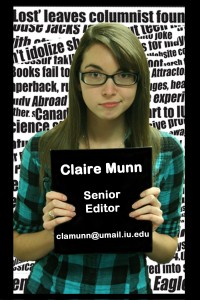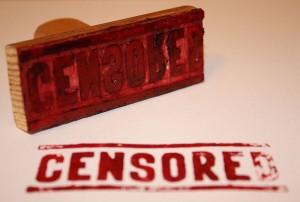 The greatest right any journalist has is freedom of the press. However, while the First Amendment provides liberty to the media, censorship is still very much alive.
The greatest right any journalist has is freedom of the press. However, while the First Amendment provides liberty to the media, censorship is still very much alive.
Recently, Jeffersonville High School’s newspaper — The Hyphen — was placed under serious prior review by the principal, James Sexton.
The reasoning behind this injustice was to review the publication for errors, including grammar and content.
Sexton continued to deny this was any form of censorship.
There’s a difference between censoring for purposes of libel and censorship in order for administration to make themselves look better in the public eye.
What experience does this joker have in journalism to think he can monitor the work of student reporters?
Journalistic writing does not follow the same grammar rules as most English forms.
The Associated Press Stylebook presents itself as a guideline for journalists to remain consistent when writing in newspapers.
I highly doubt Sexton has much experience in this regard — he probably uses “over” when he actually means “more than.”
In Hazelwood vs. Kuhlmeier, the Supreme Court decided public school newspapers were not under the same guidelines as major newspaper companies.
They are subjected to an even lower form of the First Amendment, and the decision of allowing high school papers to be censored or not is left up to the school administrators.
Unfortunately, this allows for a constant battle between prior review of high school papers and freedom of the press.
Sadly, this is not the first time the freedom of the press has been tested.
Journalism has been especially censored during wartime. While this is mostly for the purpose of protecting confidential military information, many publications that questioned the legitimacy of war have been censored, promoting only one side of support.
When McCarthyism and the Red Scare created fear of communism in America, several journalists were blacklisted, ruining their careers. By speaking out against McCarthy, they were labeled as communists.
Only Edward R. Murrow, a former broadcast journalist, had the nerve to speak the truth of McCarthy’s insanity in the face of opposition, eventually causing McCarthy’s downfall.
 During the Bush administration, satellite photos showcasing the extent of U.S. Military destruction of the war in Afghanistan were blocked from the public.
During the Bush administration, satellite photos showcasing the extent of U.S. Military destruction of the war in Afghanistan were blocked from the public.
The pictures would have included information about the amount of civilian lives lost due to massive bombing from the American side.
This effort to control information caused a censorship of reporting on the war.
Journalism cannot be censored.
It is the responsibility of the media to create awareness about what is going on in the world.
Let’s face it, we are the true watchdogs.
In the case of JHS, I feel sorry for a principal who has little confidence in the ability of his students.
I cannot imagine what The Horizon would turn into if it were reviewed prior to publishing — Nearly Naked Mile would not have been as nearly naked.
In order to practice journalism effectively, students need to have all the tools available in order to produce a paper.
Censorship should not be used as a means for administrations and higher-ups to control the availability of news to other students.
In the end, it not only hurts the reporters, but also the school as a whole.
Newsflash — there will always be at least some grammar mistakes in a newspaper.
It just happens.
However, if students are reporting facts fairly and representing sources correctly, they should be given the same respect as other newspapers.
Officials need to quit focusing so much on what the students are doing wrong and consider instead what administration is doing wrong.
By violating this fundamental right, they are causing more harm to the public than censorship ever could.
By CLAIRE MUNN
Senior Editor
clamunn@umail.iu.edu
